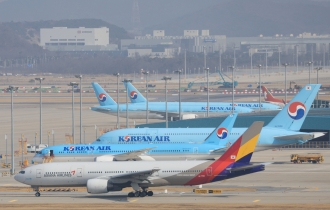Inflation weakest in 17 months, Seoul vows actions to keep inflation flat
[THE INVESTOR] South Korea‘s monthly consumer inflation came to 1 percent in January on-year, the slowest in 17 months, as the prices of agricultural goods such as vegetables slipped, data showed on Feb. 1
Calling such weak inflation an economic stability at target range, the government pledged on Feb. 1 to carry out pre-emptive measures to curb consumer price fluctuations ahead of next week’s PyeongChang 2018 Olympic Winter Games and the national Lunar New Year holiday later in the month.
“There is a need for pre-emptive measures to address concerns about inflation ahead of the national holiday, the Olympics and the minimum wage hike,” Ko Hyoung-kwon, first vice minister of the Ministry of Strategy and Finance, said in a meeting at Government Complex Seoul on Feb. 1.
The Lunar New Year holiday falls on Feb. 15-17, while Winter Games are poised to be held on Feb. 9-25.
“The ministry will strengthen oversight on consumer markets and take stern actions against any attempts to disrupt market balance like price-fixing.”
Ko added the 1 percent monthly inflation in January indicates the national economy is “in a stable condition,” below the upper bar of the 2 percent goal.
The nation’s composite consumer price index in January came to 103.46, up 1 percent from 102.43 a year prior, according to data by Statistics Korea. This marked the slowest on-year rise of consumer prices since August 2016, when the price index edged up 0.5 percent.
The reference base for the composite index is 2015, when it equals to 100.
The inflation rate for food dipped 2.6 percent on-year, contributing to the sluggish inflation. The price of vegetables sank 13.1 percent, with fruits and seafood suffering an overwhelming price surge of 5.4 percent and 4.4 percent, respectively.
By products, eggs, tomatoes and carrots fell 31.8 percent, 32.5 percent, 48.2 percent on-year, respectively. Radishes and cabbage dropped 45.3 percent and 27.8 percent.
The price of gasoline and liquefied petroleum gas surged 2.9 percent and 17.5 percent, respectively.
Statistics Korea cited base effect as the reason for the price drop, meaning the price of the goods were extraordinarily high in January 2017.
The core inflation -- excluding items subject to price volatility, like food and energy -- rose 1.1 percent on-year.
Meanwhile, the minimum income spike starting January did not affect restaurant service prices, according to the government. The monthly inflation of restaurant service prices came to 2.8 percent on-year in January, up 0.6 percentage point compared to a year prior, according to the Statistics Korea.
“Considering the tendency of a price hike among restaurants normally early in the year, the minimum wage hike appears to have had a limited impact on inflation,” Ko of the Finance Ministry said.
By Son Ji-hyoung/The Korea Herald (consnow@heraldcorp.com)
EDITOR'S PICKS
- Seoul shares rattled by Israeli attack on Iran; Kospi dips to nearly 11-week low
- S-Oil donates W560m to support firefighters
- LG CNS teams up with Yonsei University to nurture AI specialists
- Polestar 4 to make Korean debut in June
- S. Korea pledges W23tr venture capital fund for green investment at G20 meeting
- Sungsimdang outperforms bakery giants to log sales over W100b
- France rejects opening Paris flight routes to T'way Air, deals blow to Korean Air merger
- SK hynix chief underscores chip cooperation between Korea, US















